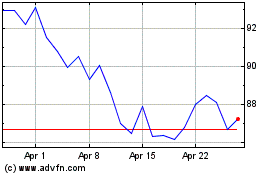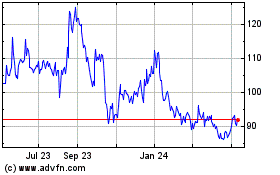Pfizer Covid-19 Vaccine Starts Testing in Young Children
March 25 2021 - 12:59PM
Dow Jones News
By Jared S. Hopkins
Pfizer Inc. said Thursday it has started testing its Covid-19
vaccine in young children, a key step toward broadening vaccination
efforts.
Researchers administered the first doses of the vaccine to
children enrolled in the study, which is evaluating the shots in
children six months to 11 years. Pfizer expects initial results by
the end of the year.
The vaccine, which Pfizer developed with BioNTech SE, is
authorized for use in people 16 years and older. Pfizer had earlier
started testing the vaccine in children ages 12 years to 15
years.
Children appear to be at lower risk of contracting the
coronavirus than adults. When they are infected, they tend to
experience milder symptoms, though some get seriously ill and can
spread the virus.
Children make up about 13% of Covid-19 cases in the U.S.,
according to the American Academy of Pediatrics.
Doctors and health authorities say it will be important to
vaccinate children, not only to protect them from the virus but
also to help reach the communitywide protection known as herd
immunity.
"If you really want to vaccinate somewhere between 70% to 80% of
the population to achieve herd immunity, neglecting a large
component of the population isn't the right thing to do," said
Emmanuel Walter, professor of pediatrics and chief medical officer
of the Duke Human Vaccine Institute in Durham, N.C., which
administered the vaccine to the first subjects Wednesday.
The Pfizer-BioNTech vaccine is among three authorized for use in
the U.S., along with shots from Moderna Inc. and Johnson &
Johnson.
Most of the Covid-19 vaccination efforts in the U.S. and abroad
have focused on protecting older adults who are at higher risk of
severe disease caused by the coronavirus than children.
The vaccines from Moderna and Johnson & Johnson are
authorized in the U.S. for use in adults 18 years and older.
Both New York-based Pfizer and Moderna last year started testing
their vaccines in children 12 years and older. J&J said it is
in discussions with regulators to start pediatric testing of its
vaccine, though it didn't give a timeline.
Pfizer expects to submit to regulators results from the trial
evaluating the vaccine in children 12 to 15 years in the coming
weeks, Pfizer Chief Executive Albert Bourla said Tuesday at The
Wall Street Journal's Health Forum.
Similar to adult trials, researchers must recruit healthy
volunteers to test the vaccines, but the process can be
time-consuming because parental consent is needed, pediatricians
said.
Earlier this month, Moderna began testing its shot in children 6
months to 11 years.
Pfizer's latest pediatric study will enroll up to 4,644 children
in the U.S. and Europe. The young volunteers will receive two doses
three weeks apart, as is the current dosing regimen.
Initially, researchers will test various doses in different age
groups to find the most appropriate dose for further testing.
Researchers will first evaluate doses in kids 5 to 11 years before
moving onto children who are 2 to 5 years and finally, those 6
months to 2 years old.
After they settle on a dose for each age group, researchers will
test the vaccine in more children. They will administer the vaccine
to two-thirds of study subjects and give a placebo to the rest.
Pfizer said researchers will determine the vaccine's
effectiveness in children in one of two ways.
One way would hinge on whether researchers could determine what
level of immune response generated by the vaccine is sufficient to
provide protection. If researchers can, they would measure whether
young vaccinated subjects reached that so-called correlate of
protection.
Researchers could also compare the response in the young study
subjects to the response found in young adults in the vaccine's
pivotal trial.
Write to Jared S. Hopkins at jared.hopkins@wsj.com
(END) Dow Jones Newswires
March 25, 2021 12:44 ET (16:44 GMT)
Copyright (c) 2021 Dow Jones & Company, Inc.
BioNTech (NASDAQ:BNTX)
Historical Stock Chart
From Mar 2024 to Apr 2024

BioNTech (NASDAQ:BNTX)
Historical Stock Chart
From Apr 2023 to Apr 2024
